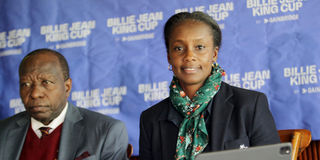Preps in top gear for Billie Jean King Africa Cup

Tennis Kenya Secretary-General Wanjiru Mbugua-Karani (right) and Nairobi Club chairman George Otieno address a press conference at Nairobi Club on May 31, 2023 on the preparations of the upcoming Billie Jean King Cup Africa Group III event.
What you need to know:
- The 12 countries will be divided into two pools of six teams and matches played in a round-robin format.
- Pool winners will meet in the final to decide the team promoted to Europe/Africa Group II. There will be ranking matches with the two bottom sides in their pools engaging in a relegation playoff.
Tennis Kenya (TK) expects the Billie Jean King Cup Africa Group III at the Nairobi Club clay courts from June 12-17 to be a game-changer in the country and Africa.
The national tennis governing body is currently preparing to welcome top players from 11 countries - Botswana, Burundi, Ghana, Mauritius, Morocco, Namibia, Nigeria, Seychelles, Tunisia, Uganda and Zimbabwe – who will fight with Kenya for promotion to 2024 Europe/Africa Group II.
Nineteen-year-old Junior Wimbledon Doubles champion Angella Okutoyi and her twin sister Roselida Asumwa along with Alicia Owegi,19, and Cynthia Wanjala,18, will represent Kenya who are hosting the event for the second time since 1995 when it was known as Fed Cup.
Stacy Yego,15, and Zimbabwe-based Melissa Mwakha,14, are reserve players.
J30 Bulawayo champion Mwakha, who is already being touted as the next big thing in Kenyan tennis after Okutoyi, was expected in Nairobi on Wednesday evening from Zimbabwe where she lives with her mother.
“Hosting the Billie Jean King Cup in Africa is historic. It’s the first time we are having a tournament for African teams alone in Africa. The impact will be huge in Africa as it will ignite tennis in Kenya and empower African players. Previously, the tournament was held in Europe involving teams from Africa and Europe.
African countries struggled to play in Europe because it is very expensive. Participation used to be 50 percent, but the new format starting in 2023 has 100 percent participation,” said TK Secretary-General Wanjiru Mbugua-Karani in a press briefing in Nairobi on Wednesday.
She disclosed that TK lobbied for an African group to be hosted in Africa and Kenya won the bid to host the tournament.
Wanjiru represented Kenya in Fed Cup 28 years ago alongside Shaila Ali, Phyllis Wilunda and Ambreen Rana on the murram courts which are currently being replaced with internationally-recognised clay courts after almost 120 years.
Kenya lost to Yugoslavia, Ireland and Malta 3-0 and defeated Cyprus 2-1.
TK president James Kenani said hosting the Billie Jean King Cup will popularize tennis and inspire its growth in the country. He, however, bemoaned the lack of help from the government.
“For the last two years, Tennis Kenya did not get any financial assistance from the government. The government has also not started construction of the 26 public tennis courts at Moi Sports Centre Kasarani despite the pledge made by the former President Uhuru in 2019,” lashed out Kenani.
He also challenged Kenyan universities to offer scholarships to tennis players. “We have about six Kenyan tennis players on scholarships in the USA. How come our universities are not taking up the challenge?” posed Kenani.
In attendance was Principal Sports Officer from the Department of Sports, Abel Manyara, who said that the government plans to come in a big way to support the Billie Jean King Cup.
Nairobi Club chairman George Otieno was confident that Tennis Kenya will make good use of the new facilities to promote tennis in the country and to showcase the hospitality.
Nine clay courts are being constructed and are expected to be ready by next week ahead of the Africa Group III tournament which is part of 2024 Paris Olympics qualifiers.
Captains meeting and draw is on June 11. The 12 countries will be divided into two pools of six teams and matches played in a round-robin format.
Pool winners will meet in the final to decide the team promoted to Europe/Africa Group II. There will be ranking matches with the two bottom sides in their pools engaging in a relegation playoff.
The team occupying last spot at the end of Africa Group III will be relegated to Africa Group IV in 2024.
It will switch places with the 2023 Group IV winner from the list of Rwanda, Ethiopia, Congo Republic, Democratic Republic of Congo, Madagascar, Mozambique, Tanzania, Cameroon, Lesotho, Angola and Seychelles.





